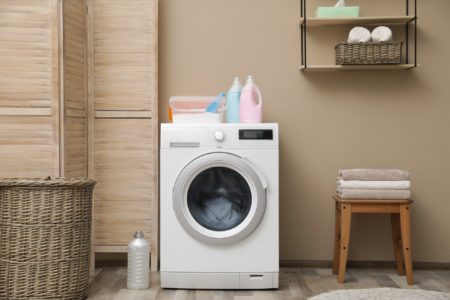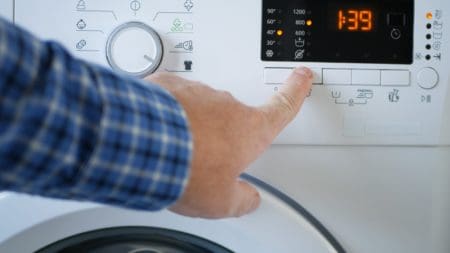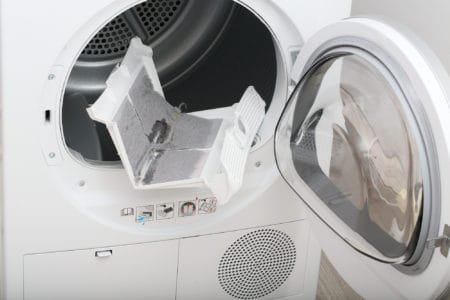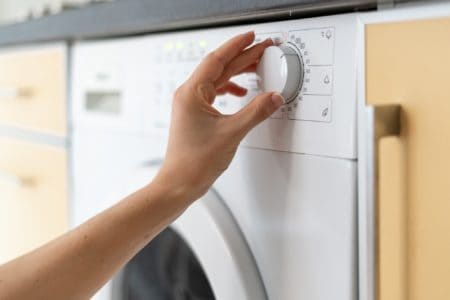A washing machine is an expensive appliance to purchase. So if you’ve purchased one recently, you may be wondering how long a washing machine lasts, and if there’s something you can do to help it last longer.
So today, we’re discussing how long a washing machine should last and what can be done to make sure that it lasts longer.
Key Takeaways
- Washing machines typically last between 10 and 14 years, with 5,100 loads of laundry in their lifetime.
- Lifespan varies by brand, with Speed Queen lasting up to 25 years and other brands like LG, Kenmore, and Whirlpool lasting around 10-15 years.
- To extend the life of a washing machine, avoid overloading, level the machine, use the correct amount of detergent, and regularly clean the machine.
- Signs that a washing machine may need replacement include leaking, excessive noise, drum not filling, and inefficiency.
How Long Does a Washing Machine Last?
A washing machine is expected to last around 10-14 years. Some models last longer than others.
The life expectancy of a washer also depends on the amount of laundry that is washed. It assumes that the washing machine washes one load of clothes every day, or 5100 loads. If you need to wash more loads each day, the washer’s life expectancy will be reduced. However, washing a few loads each week will help your washing machine last longer.
In addition, the size and weight of a load of laundry will affect the washer’s life expectancy. Heavy loads require more of the washer than a light load. So if you’re washing many heavy loads each week, your washing machine may not last as long as if you’re washing only light loads.
Washing Machine Lifespan By Brand
Washing Machine Lifespan by Brand If Machine Is Cared for Properly
| Speed Queen | 25 years or 10,400 loads |
| LG | 10-15 years |
| Kenmore | 10-13 years |
| General Electric or GE | 11-12 years |
| Electrolux | At least 10 years |
| Frigidaire | At least 10 years |
| Maytag | Usually last 10 years |
| Whirlpool | Usually last 10 years |
| Samsung | 10 years |
| Bosch | 10 years |
When to Replace Washing Machine
A washing machine will develop various problems as it ages. If one of these issues occurs, it may be time to consider replacing your washing machine.
Leaking
A washing machine that begins leaking water all over your laundry room is a bad sign. First, check all the hoses going in and out of your washer. Also, make sure that the connections are not leaking.
If these are not the issue, it may be a cracked tub which means your washer needs to be replaced.
Noise and Machine Movement
Your washing machine may begin making new noises that you haven’t heard before or may begin moving strangely. If this happens, check to be sure that the machine isn’t overloaded or off balance. Then check to make sure that the washing machine is level and there are no obvious loose parts.
The shock absorber may also be damaged which will prevent it from dampening the vibrations of your washing machine.
You’ll need to call a professional if you can’t discover the source of the new noise or movement.
Drum Isn’t Filling
If the drum of your washing machine isn’t filling with water when you start a new load, you should first check for kinks and blockages in the hoses and intake valves. Call a professional if you’re unable to find a problem and fix your washing machine.
Inefficient
Older washing machines are not as energy and water efficient as the newer high-efficiency machines. If your washing machine is very old, you may wish to replace it with a newer HE washer that will save you money on your monthly energy and water bills.
Is It Worth Repairing a Washing Machine?
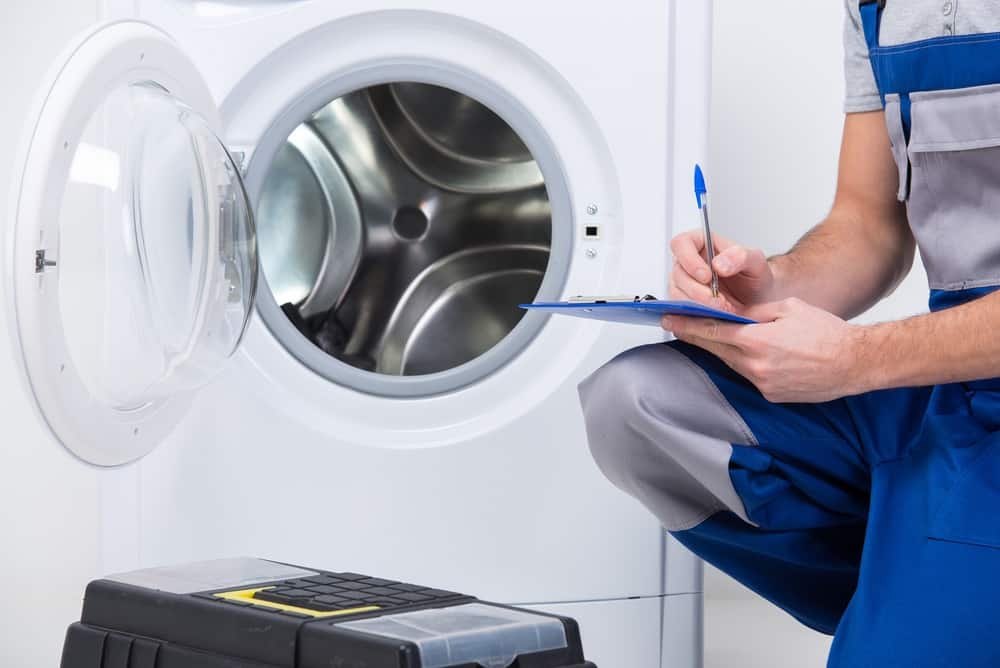
Repairing a washing machine can be expensive, but so is the cost of a new washing machine. So, when do you replace a washing machine instead of repairing it?
The rule of thumb is that if you have an older washing machine replacing it makes more sense than repairing it. The various parts of your washing machine will be wearing out and you may need a long series of repairs to make sure that your washing machine works.
Another piece of advice is if the cost of the repair is more than 50% of the cost of a new machine, you should also consider replacing your washing machine.
In general, if your washing machine is new and the repair is inexpensive, it’s best to repair your machine. However, if your washing machine is old and requires an expensive repair, you’re likely better off replacing your washing machine.
How Can I Make My Washing Machine Last Longer?
A washing machine can last longer if you care for it properly and treat it well. Here are some tips to help your washing machine last longer.
Check Hoses
Check the hoses connected to your washing machine every few months. You’re looking for cracks or bulges. Also, make sure that the fittings are tight and there’s enough space around the washing machine so the hoses don’t kink, bulge, or crack prematurely.
Consider replacing your hoses every 5 years.
Don’t Overload Your Washer
Overloading your machine will make the motor of your washing machine work harder and it risks damaging the motor. So it’s better to wash heavy items in small loads or distribute them among lighter items.
Level Your Washer
Your washing machine needs to be level for it to work correctly. An unlevel machine may move more than expected causing damage to both the machine and items around it.
To level your washing machine, place a level on the machine and adjust the washer legs until the bubble inside the level is centered.
Use the Correct Amount of Detergent
Make sure that you use the correct amount of detergent. The detergent will act as a lubricant and prevent your clothing from rubbing against each other and becoming clean. In addition, the detergent residue is a breeding ground for mold, mildew, and bacteria which will cause your machine to stink.
Clean Your Washing Machine
Make sure that you clean your washing machine regularly. A traditional washer may only need to be cleaned twice a year. However, HE washing machines require cleaning every month.
Also consider cleaning your washing machine more often if you live in a hot and humid environment which will promote the growth of mold, bacteria, and mildew.
You will also need to clean the interior of your washing machine. Check the rubber door gasket for dirt, grime, and small particles. Look for areas where dirt is building up so you can clean these areas before a larger problem develops.
Leave the Door Open and Empty Quickly
Make sure that you leave the door of your washing machine open so air can flow into your machine. This will allow it to dry out and prevent mold and mildew from growing.
Also, empty your washing machine as quickly as possible when the cycle is finished. This will also help to keep bacteria from growing in your machine.
How Long Does a Dryer Last?
Most dryers will last 10-13 years before needing to be replaced.
FAQs
How Long Do Washers and Dryers Last
Most washing machines will last around 10-14 years no matter whether they’re a front load or top load washer. You can extend the lifespan of your machine with proper care and maintenance. A dryer has a similar lifespan, and you can expect it to last around 10-13 years.
